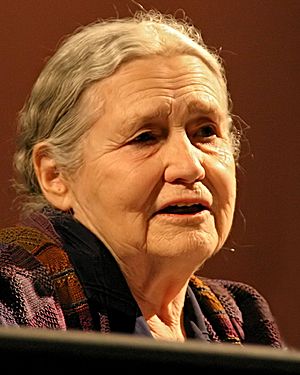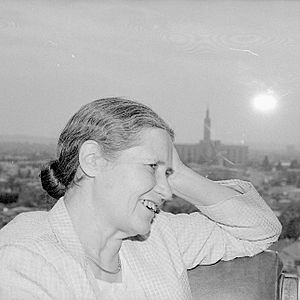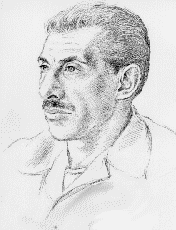Doris Lessing facts for kids
Quick facts for kids
Doris Lessing
CH OMG
|
|
|---|---|

Lessing in 2006
|
|
| Born | Doris May Tayler 22 October 1919 Kermanshah, Iran |
| Died | 17 November 2013 (aged 94) London, England |
| Pen name | Jane Somers |
| Occupation | Writer |
| Nationality | British |
| Period | 1950–2013 |
| Genre |
|
| Literary movement |
|
| Notable works |
|
| Notable awards |
|
| Spouse |
Frank Charles Wisdom
(m. 1939; div. 1943)Gottfried Anton Nicolai Lessing
(m. 1943; div. 1949) |
| Children |
|
Doris May Lessing (born Tayler; 22 October 1919 – 17 November 2013) was a famous British-Zimbabwean writer. She was born in Iran to British parents and lived there until she was six years old. Her family then moved to Southern Rhodesia (now Zimbabwe), where she stayed until 1949. After that, she moved to London, England.
Doris Lessing wrote many well-known novels. Some of her most famous books include The Grass Is Singing (1950), the five-book series Children of Violence (1952–1969), and The Golden Notebook (1962). She also wrote a science fiction series called Canopus in Argos: Archives.
In 2007, Lessing won the Nobel Prize in Literature. The Swedish Academy, which gives out the award, called her a writer who explored "the female experience" with great insight. At 87 years old, she was the oldest person to ever win the Nobel Prize in Literature. In 2001, she received the David Cohen Prize for her amazing work in British literature throughout her life. The Times newspaper also named her one of the top 50 British writers since 1945.
Contents
Life Story of Doris Lessing
Her Early Years
Doris May Tayler was born in Kermanshah, Iran, on 22 October 1919. Her parents, Alfred and Emily Tayler, were both British. Her father had been injured in World War I and met her mother, a nurse, while recovering. They moved to Iran because her father got a job at a bank there.
In 1925, when Doris was six, her family moved to Southern Rhodesia (now Zimbabwe). They bought a large farm to grow crops like maize. Her mother hoped for a fancy lifestyle, but the family often struggled with money, and the farm did not make much income.
Doris went to school at the Dominican Convent High School and then Girls High School in Salisbury (now Harare). She left school at age 13 and continued to learn on her own by reading widely. At 15, she left home and worked as a nursemaid. During this time, she started reading books about politics and society and began writing her own stories.
In 1937, Doris moved to Salisbury and worked as a telephone operator. She soon married her first husband, Frank Wisdom. They had two children, John (born 1940) and Jean (born 1941). Their marriage ended in 1943.
Moving to London and Her Beliefs
After her first marriage ended, Doris became interested in a group called the Left Book Club. There, she met her second husband, Gottfried Lessing. They married and had a son named Peter (born 1946) before divorcing in 1949. She did not marry again after that.
In 1949, Lessing moved to London with her younger son, Peter. She wanted to focus on her writing career and her belief in socialism, which is a political idea about sharing wealth and power.
Doris Lessing was a strong supporter of important causes. She spoke out against nuclear weapons and against apartheid, which was a system of racial separation in South Africa. Because of her views, she was not allowed to enter South Africa or Rhodesia for many years. In 1956, she left the Communist Party of Great Britain, a political group, after the Soviet Union invaded Hungary. In the 1980s, she also spoke against Soviet actions in Afghanistan.
Over time, Lessing became less interested in political ideas like Marxism. She started to explore spiritual ideas, especially Sufism, which is a mystical branch of Islam.
Her Writing Career
Doris Lessing began selling her stories to magazines when she was 15. Her first novel, The Grass Is Singing, was published in 1950. The book that made her famous around the world, The Golden Notebook, came out in 1962. By the time she passed away, she had published more than 50 novels. She even wrote some books using a fake name, called a pseudonym.
In 1982, Lessing wrote two novels under the name Jane Somers. She did this to show how hard it can be for new writers to get their books published. Her usual publisher in the UK turned them down, but another publisher accepted them. The books, The Diary of a Good Neighbour and If the Old Could, were published in 1983 and 1984. Later, they were re-released under her real name, Doris Lessing.
Lessing was offered a special honor called a "damehood" in 1992, but she turned it down because she felt it was linked to an old idea of an empire. She had also turned down another honor in 1977. However, in 1999, she accepted an appointment as a Companion of Honour for her great service to the country. She was also made a Companion of Literature by the Royal Society of Literature.
In 2007, Lessing won the Nobel Prize in Literature. She was 88 years old, making her the oldest person at that time to win the literature prize. She was also only the eleventh woman to receive this award in the Nobel Prize's history.
Her Later Years and Passing
In the late 1990s, Doris Lessing had a stroke, which made it difficult for her to travel in her later years. She still enjoyed going to the theater and opera. She often thought about death and wondered if she would have enough time to finish new books.
Doris Lessing passed away on 17 November 2013, at her home in London. She was 94 years old. Her two sons had passed away before her, but she was survived by her daughter, Jean, who lives in South Africa. She was remembered with a special non-religious funeral service.
Doris Lessing's Books
Doris Lessing's writing style changed over time, and her books are often grouped into three main periods.
First, during her "Communist phase" (1944–1956), she wrote about social issues. Her first novel, The Grass Is Singing, and her short stories in African Stories are set in Southern Rhodesia (now Zimbabwe), where she lived then.
Next came her "psychological phase" (1956–1969). This period includes her famous book The Golden Notebook and the "Children of Violence" series. These books often explored the inner thoughts and feelings of her characters.
Her third phase was the "Sufi phase," which she explored in her later works, especially in her Canopus in Argos series. She called these "space fiction" novels. These books explore ideas about advanced societies and how they try to help other worlds, including Earth, grow and develop. She used ideas from Sufism, which she learned about from her friend and teacher Idries Shah.
Some literary critics had mixed feelings about Lessing's Canopus series. However, Lessing herself said that science fiction often contains some of the best "social fiction" of our time. She also admired classic science fiction writers. She even attended a big science fiction convention in 1987 as a special guest.
Lessing's novel The Golden Notebook is seen by some as an important book for feminism, which is about equal rights for women. However, Lessing herself didn't like being called a "feminist author." She felt that critics missed her main point in the book, which was about how mental breakdowns can help people heal and see things more clearly. She also wished critics had appreciated the unique way the novel was structured.
Doris Lessing Society
The Doris Lessing Society is a group that helps people study Lessing's writings. It started in 1977 with a newsletter, which later became an academic journal called Doris Lessing Studies. The Society also holds meetings and conferences to discuss her work.
Where Her Writings Are Kept
Many of Doris Lessing's original writings, like her manuscripts and typed drafts, are kept at the Harry Ransom Center at the University of Texas at Austin. This collection includes almost all of her works up to 1999.
Another smaller collection of her materials is at the McFarlin Library at the University of Tulsa.
The University of East Anglia also holds Doris Lessing's personal archive. This includes many of her professional and personal letters, such as love letters from the 1940s when she lived in Zimbabwe. It also has her personal diaries from over forty years. Some parts of this archive are still private while her official biography is being written.
Awards She Received
- Somerset Maugham Award (1954)
- Prix Médicis étranger (1976)
- Austrian State Prize for European Literature (1981)
- Shakespeare-Preis der Alfred Toepfer Stiftung F.V.S., Hamburg (1982)
- WH Smith Literary Award (1986)
- Palermo Prize (1987)
- Premio Internazionale Mondello (1987)
- Grinzane Cavour Prize (1989)
- James Tait Black Memorial Prize for biography (1995)
- Los Angeles Times Book Prize (1995)
- Catalonia International Prize (1999)
- Order of the Companions of Honour (1999)
- Companion of Literature of the Royal Society of Literature (2000)
- David Cohen Prize (2001)
- Premio Príncipe de Asturias (2001)
- S.T. Dupont Golden PEN Award (2002)
- Nobel Prize in Literature (2007)
- Order of Mapungubwe: Category II Gold (2008)
See also
 In Spanish: Doris Lessing para niños
In Spanish: Doris Lessing para niños
 | Delilah Pierce |
 | Gordon Parks |
 | Augusta Savage |
 | Charles Ethan Porter |



